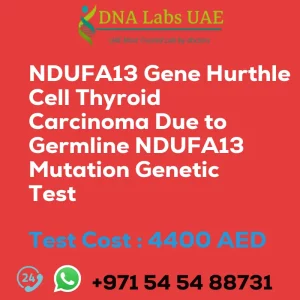TGFBR2 Gene Colorectal Cancer Hereditary Nonpolyposis Type 6 Genetic Test
At DNA Labs UAE, we offer the TGFBR2 Gene Colorectal Cancer Hereditary Nonpolyposis Type 6 Genetic Test. This test is designed to identify mutations in the TGFBR2 gene that can increase the risk of developing colorectal cancer.
Test Details
The TGFBR2 gene codes for a protein called transforming growth factor beta receptor 2, which plays a role in regulating cell growth and division. Mutations in this gene can lead to an increased risk of developing colorectal cancer and other types of cancer, such as endometrial, ovarian, and stomach cancer.
The TGFBR2 Gene Colorectal Cancer Hereditary Nonpolyposis Type 6 Genetic Test is performed using NGS (Next-Generation Sequencing) technology. This advanced genetic testing method allows us to analyze multiple genes simultaneously and detect various types of genetic mutations.
Components and Price
The cost of the TGFBR2 Gene Colorectal Cancer Hereditary Nonpolyposis Type 6 Genetic Test is 4400.0 AED. The test can be performed using either blood or extracted DNA, or by using one drop of blood on an FTA card.
Report Delivery and Method
After the test is conducted, the report will be delivered within 3 to 4 weeks. The NGS technology is used to analyze the genetic material and identify any mutations in the TGFBR2 gene.
Test Type and Doctor
The TGFBR2 Gene Colorectal Cancer Hereditary Nonpolyposis Type 6 Genetic Test falls under the category of cancer genetic testing. It is recommended to consult with an oncologist for this test.
Test Department and Pre Test Information
This test is conducted in the Genetics department. Prior to the test, it is important to provide the clinical history of the patient who is going for the TGFBR2 Gene Colorectal Cancer Hereditary Nonpolyposis Type 6 Genetic Test. A genetic counseling session will be conducted to draw a pedigree chart of family members affected with TGFBR2 Gene Colorectal Cancer, hereditary nonpolyposis type 6.
Importance of the Test
The TGFBR2 Gene Colorectal Cancer Hereditary Nonpolyposis Type 6 Genetic Test is crucial in assessing an individual’s risk of developing colorectal cancer and other associated cancers. The information obtained from this test can guide appropriate screening and preventive measures to ensure early detection and treatment.
Don’t wait until it’s too late. Take control of your health by getting the TGFBR2 Gene Colorectal Cancer Hereditary Nonpolyposis Type 6 Genetic Test today!
| Test Name | TGFBR2 Gene Colorectal cancer hereditary nonpolyposis type 6 Genetic Test |
|---|---|
| Components | |
| Price | 4400.0 AED |
| Sample Condition | Blood or Extracted DNA or One drop Blood on FTA Card |
| Report Delivery | 3 to 4 Weeks |
| Method | NGS Technology |
| Test type | Cancer |
| Doctor | Oncologist |
| Test Department: | Genetics |
| Pre Test Information | Clinical History of Patient who is going for TGFBR2 Gene Colorectal cancer, hereditary nonpolyposis type 6 NGS Genetic DNA Test. A Genetic Counselling session to draw a pedigree chart of family members affected with TGFBR2 Gene Colorectal cancer, hereditary nonpolyposis type 6 NGS Genetic DNA Test gene TGFBR2 |
| Test Details |
The TGFBR2 gene is a gene that codes for a protein called transforming growth factor beta receptor 2. This protein is involved in cell signaling pathways that regulate cell growth and division. Mutations in the TGFBR2 gene can lead to an increased risk of developing certain types of cancer, including colorectal cancer. Colorectal cancer, hereditary nonpolyposis type 6 (HNPCC6), also known as Lynch syndrome, is a hereditary condition characterized by an increased risk of developing colorectal cancer and other types of cancer, such as endometrial, ovarian, and stomach cancer. HNPCC6 is caused by mutations in genes involved in DNA mismatch repair, including the TGFBR2 gene. NGS (Next-Generation Sequencing) genetic testing is a type of genetic test that can analyze multiple genes simultaneously and detect various types of genetic mutations. In the case of colorectal cancer, hereditary nonpolyposis type 6, NGS genetic testing can identify mutations in the TGFBR2 gene and other genes associated with Lynch syndrome. This information can help in assessing an individual’s risk of developing colorectal cancer and guide appropriate screening and preventive measures. |







